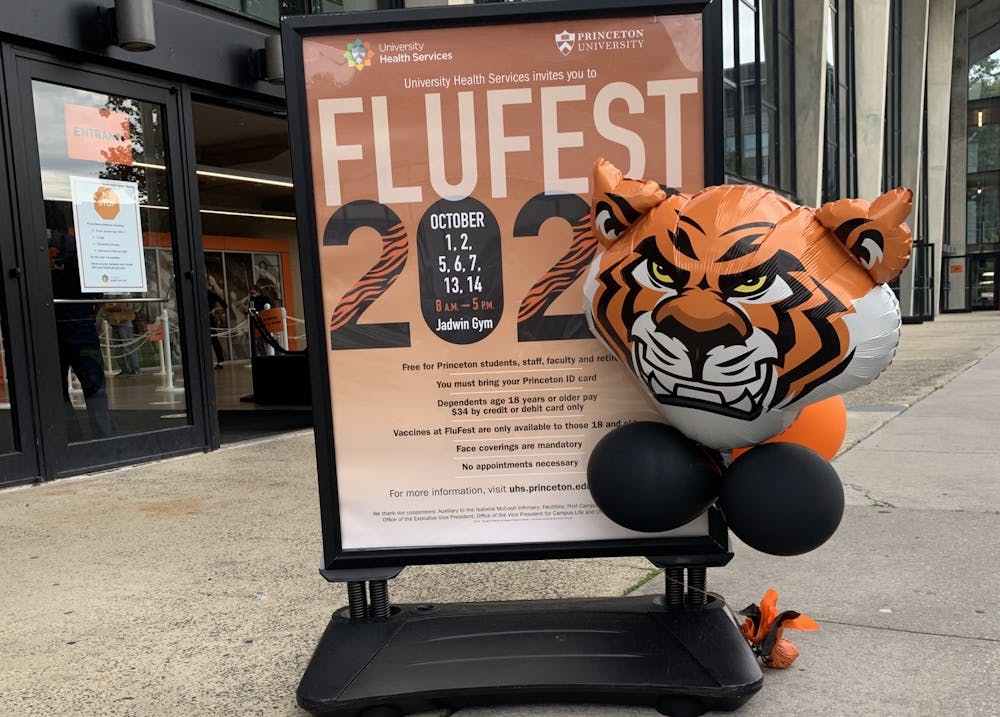A total of 4,481 students, faculty, and staff received free flu shots from University Health Services (UHS) at Jadwin Gymnasium through the University’s annual FluFest.
This year’s FluFest was held on seven separate days in early October. All students living on campus or authorized to visit for ROTC or research purposes were required to receive a flu vaccination.
Among those vaccinated, 402 were undergraduates, 1,519 were graduate students, 1,856 were staff, and 497 were faculty, according to the University’s Office of Communications. An additional 154 were dependents, and 53 were affiliates.
About 260 undergraduates were approved to live on campus this fall, so many of the 402 undergraduates vaccinated are likely living off-campus in Princeton or the local area.
The CDC recommends that everyone older than six months receives a flu shot every year. This year, flu vaccinations are especially important.
“This flu season will coincide with COVID-19 still circulating in our community, both locally and globally,” wrote John Kolligian, the Executive Director of University Health Services, in an email to The Daily Princetonian. “This means that preventing the flu during 2020–2021 is more important than ever, not least because a high number of hospital admissions due to flu could overwhelm already stretched health care systems.”
Kolligian emphasized in his email that the University’s goal is expanding coverage of the vaccine.
“We have a responsibility to our local community as well as our enrolled students, even if they are not visiting the campus currently, to protect their health during this time,” he wrote. “Making flu shots accessible to everyone in the Princeton University community is a way of protecting both individuals at high risk of serious illness as well as of not overburdening our healthcare partners.”
Students and faculty who attended the FluFest reported a positive experience.
“I appreciate that the University is giving [off-campus students] free flu shots,” said Jacob Barber ’22, who lives off campus, about five minutes away from the University. He explained that the process took 10–15 minutes and was “very efficient.”
Yuqi Liang ’23, who lives on campus, agreed: “There were clear instructions everywhere and the staff members were very helpful.”
Liang also noted that the clinic followed COVID-19 safety protocols and measures.

“There were stickers on the floor marking out the six foot distance … and of course everyone was wearing a mask,” he said.
Director of the Program in Latin American Studies Gabriela Nouzeilles also received a flu shot at the clinic.
“I am very pleased that the University is sponsoring the FluFest to provide faculty, staff, and students with free flu shots,” she said. “There were no lines and the nurses at the clinic were professional and kind.”
Flu vaccination will be important even for students not currently living on or near campus.
In an email Kolligian sent to all students on Sept. 16, he wrote, “Any students who may be returning to campus in the spring will also be asked to provide documentation that they have received a flu shot. Attending FluFest is a great opportunity to get this requirement out of the way for the spring semester.”
Students not living near the University can also receive coverage or a discount on flu shots. Kolligian recommended students visit the Center of Disease Control’s VaccineFinder if looking to get a vaccine in the United States. He added that most insurance plans, including the Student Health Plan, cover flu shots.








